英语中考复习习惯用法解析
初三英语惯用法和句型知识点大全

初三英语惯用法和句型知识点大全|初三复习计划一、简单句的五类结构句型:1、主语+不及物动词 Class begins.2、主语+不及物动词+宾语 We like English.3、主语+连系动词+表语 They all look fine.4、主语+不及物动词+间接宾语+直接宾语 My mother gave me a present.5、主语+不及物动词+宾语+宾语补足语 The teacher asked me to practise English.二、含有ing句型:一)固定结构:1. keep doing2. keep /carry on doing3. keep sb. Doing4. enjoy doing (He enjoys nothing but playing the computer.)5. finish doing6. be afraid of doing7. be worth doing8. be busy doing9. be/get/become used to doing (We are used to living in the countryside. )10. dislike doing (She dislikes doing housework.)11. how about doing//what about doing12. spend some time (in)doing13. spend some money (in) buying14. feel like doing15. stop/keep/prevent … from doing16. thank you for doing17. thanks for doing18. do some cooking/cleaning/reading/shopping/washing19. go swimming/fishing/shopping/skating/boating20. mind doing21. prefer doing … to doing…22. practise (practice) doing (He practices speaking English every day.)23. can’t help doing24. have fun/difficulty/trouble/problem doing sth.25. waste time/money doing26. instead of doing27. miss doing28. look forward to doing期望(渴望)做某事 (I'm looking forward to getting your letter.)29. thank…for doing二)动词-ing在句中作表语:Our plan is setting up a new car factory.My job is teaching/driving.这类词作表语,起解释说明主语的作用,主表可颠倒:Teaching is my job. 转换三)need, require, want译作“需要”时,跟动词-ing作宾语,主动表示被动,相当于to be done,如:1.The windows require cleaning. (The windows require to be cleaned. )2.The patient needs operating on at once. (The patient needs to be operated on. )3.The flowers want watering. (The flowers want to be watered. )。
初中英语知识点归纳动词短语和习惯用语的运用

初中英语知识点归纳动词短语和习惯用语的运用动词短语和习惯用语是初中英语学习中的重要部分,它们广泛应用于日常交流和写作中。
掌握这些知识点不仅可以提升我们的英语表达能力,还可以帮助我们更好地理解英语文章和对话。
本文将对初中英语中常见的动词短语和习惯用语进行归纳总结,并分别进行相关的例句说明。
一、动词短语的运用1. Look forward to(期待)I'm looking forward to the summer vacation.2. Take place(发生)The meeting will take place next week.3. Give up(放弃)Don't give up when you encounter difficulties.4. Get along with(与...相处)He gets along well with his classmates.5. Put off(推迟)We decided to put off the picnic due to bad weather.6. Come up with(提出)They came up with a great idea for the project.7. Settle down(安定下来)After graduation, she settled down in a small town.8. Break down(出故障)The car broke down on the way to the airport.9. Bring up(抚养)She brings up two children all by herself.10. Look up to(尊敬)I look up to my parents as my role models.二、习惯用语的运用1. All of a sudden(突然地)All of a sudden, it started to rain heavily.2. Piece of cake(小菜一碟)The math problem is a piece of cake for him.3. Keep an eye on(密切关注)Please keep an eye on my bag while I go to the restroom.4. Have a sweet tooth(喜爱甜食)I have a sweet tooth, so I can't resist desserts.5. Catch one's breath(屏住呼吸)The breathtaking view made us catch our breath.6. Break the ice(打破沉默)She told a joke to break the ice at the party.7. Hit the books(开始用功念书)It's time to hit the books and prepare for the exam.8. Face the music(面对现实)You have to face the music and accept the consequences.9. In the long run(从长远来看)Exercising regularly is beneficial in the long run.10. Break a leg(祝好运)Break a leg in your performance tonight!综上所述,动词短语和习惯用语在初中英语中的应用非常广泛,掌握这些知识点对于学习和提高英语水平至关重要。
英语语法与惯用法知识点总结.doc

英语语法与惯用法知识点总结【英语语法】一、语法与惯用法知识点:习惯上后接in doing sth的常见名词1.delay 耽搁; 延迟,拖延用于delay in doing sth,表示“在做某事方面的耽搁”。
如:Excuse me for my delay in answering your letter.迟复为歉。
My delay in going abroad is due to my illness.我推迟出国是由于我生病了。
2. delight 快乐,乐趣用于delight in doing sth,表示“做某事的乐趣”“以做某事为乐”。
如:He finds delight in giving to others.他以助人为乐。
I find a perverse delight in listening to traffic.我从听车流噪音中找到一种怪异的乐趣。
注意有用结构take delight in doing sth(喜欢做某事,从做某事中取乐)。
如:She took delight in teasing me.她老爱跟我开玩笑。
Now many people take delight in watching TV.现在许多人都喜欢看电视。
He takes great delight in proving others wrong.他的极大乐趣是证实别人错了。
3. harm 危害用于harm in doing sth,表示“做某事的危害”,尤其用于no harm in doing sth结构。
如:What’s the harm in having a little fun?开点玩笑有什么不好?He may not be able to help but there’s no harm in asking him.他可能帮不了忙,但是求他一下倒也无妨。
The problem may not arise, but there’s no harm in keeping our powder dry.问题不一定会发生,但有备无患并无害处。
英语复习常用动词习惯用法
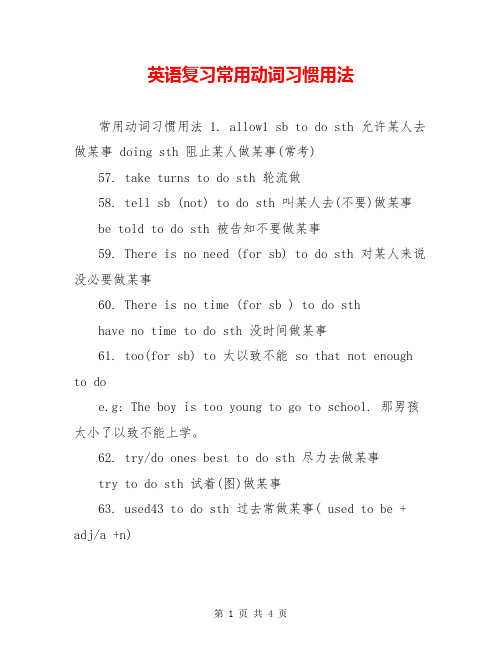
英语复习常用动词习惯用法常用动词习惯用法 1. allow1 sb to do sth 允许某人去做某事 doing sth 阻止某人做某事(常考)57. take turns to do sth 轮流做58. tell sb (not) to do sth 叫某人去(不要)做某事be told to do sth 被告知不要做某事59. There is no need (for sb) to do sth 对某人来说没必要做某事60. There is no time (for sb ) to do sthhave no time to do sth 没时间做某事61. too(for sb) to 太以致不能 so that not enough to doe.g: The boy is too young to go to school. 那男孩太小了以致不能上学。
62. try/do ones best to do sth 尽力去做某事try to do sth 试着(图)做某事63. used43 to do sth 过去常做某事( used to be + adj/a +n)e.g: Mr wang used to be a teacher worker. 王先生过去是一位工人。
I used to live in the country. 过去我住在农村。
64. want/would like to do sth 想做want/would like sb to do sth 想某人做feel like doing sth 喜爱做某事(注意like后接动词ing形式)65. warn44 sb (not) to do sth 警告某人做某事(或不要做某事)66. Why dont you do sthWhy not do sth ( 为什么不(表建议的句型,注意用动词原形) )表示建议的句型还有:What How about(如果是动词,要用ing形式)Shall we67. Would you like (sb) to do sth Yes, Id love to .68. Would you mind doing sth 你介意做某事吗Never mind/Not at all/of course45 not/certainlynot . (从不介意/一点也不介意/当然不会了)69. Would you please (not) do sth 你可不可以不做70. finish doing sth enjoy doing sth practise doing sth be good at doing sth be good at doing sth thank you for doing sth stop doing sth be good at doing sth give up doing sth mind doing sth stop sb from doing sth go on doing sth be busy doing sthsee/hear/watch sb doing sth feel like doing sth hate doing sth like doing sth do well in doing sth be afraid of doing sth be interested in doing sth make a contribution46 to sth/doing sth71. 非延续性动词(终止性动词)1.buy---have(has)had2.borrow---have(has)kept3.leave---have(has)been away4.go ---have(has)been away/ine ---have(has)here/in6.die47 ---have(has)been dead487.join---have(has)been a member of/in8.begin---have(has)on 8.stop---have(has)been overexample: 他的狗死了3天了.: His dog has been dead for three days. It is three days since49 his dogdied50. His dog died three days ago.72. 感官动词:(主动语态不带to)1.hear/see/watch sb do sth 或 2. hear/see/watch sb doing sth1. We often hear him sing the song.2. I saw51 him swimming in the river just now.被动语态带to:1. He is often heard to sing the song.役使动词: (主动语态不带to) make/let sb do sth.His father often makes him do this and that.被动语态带to:He is often made52 to do this and that by his father.。
初中英语常用动词习惯用法总结
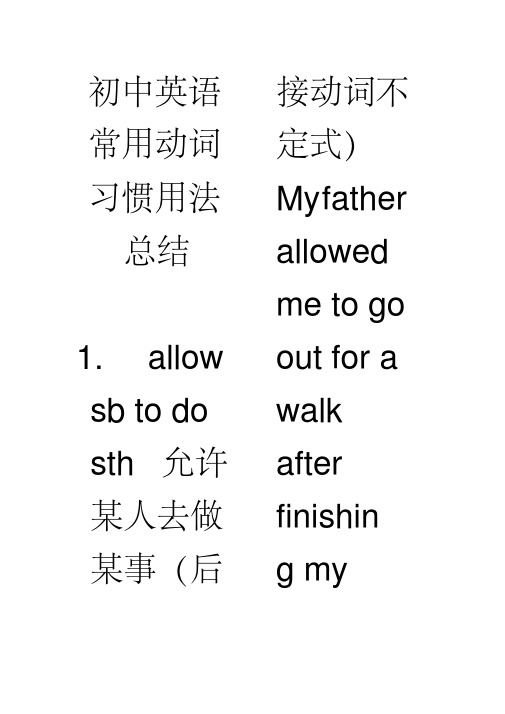
I am
was busy busy with
washing my work.
my car at 8. be
that time. coming/g
那时候我 oing/lea
正忙于清 ving/fiy
洗我的车 ing/movi
子。
ng/dying
(某些位
移动词用
进行时态 时表将 来) the bus is coming/t he dog is dying. 9. be excited to do sth
have a
afraid to
dinner
ask me
with them question
yesterday s.
.
4. be sth 害
afaid of 怕某物
doing sth He is
害怕做某 afraid of
事
snakes.
I am
6. be
afraid of amazedto
going out do sth
28.
29. get
让某人做 /have a
某事(后接 chance to
动词原形) do sth
get sb to 得到一个
do sth
做某事的
make 机会
sb do sth 30. giv
e/pass/s
how/lend /sell sb sth/sth to sb
ed in
We are
Chinese. ready for
13.
the exam.
be/get
Be ready
ready
to do sth
for/to do 为做某事
初中英语常用动词习惯用法总结

初中英语常用动词习惯用法总结1. allow sb to do sth 允许某人去做某事(后接动词不定式)My father allowed me to go out for a walk after finishin g myhomework . 2. aske d sb (not) to do sth 叫某人做事某事(叫某人不要去做某事) My father asked me to study hard. He asked me not to swim alone. be asked todo sth被叫去做某事/被邀请去做某事I was asked to have a dinner with them yesterday . 3. be afraid to do sth 害怕做某事She is afraid to ask me question s.4. be afaid of doing sth 害怕做某事 I am afraid of going out at night.5. be afaid ofsth 害怕某物 He is afraid of snakes. 6. be amazed to do sth 对做某事感到惊讶He was amazed to meet the girl there.be amazed at sth 对某事感到惊讶they were amazed at the news.7. be busy doing/wi th sth 忙于做某事(常考)e.g: I was busy washing my car at that time. 那时候我正忙于清洗我的车子。
I am busy with my work. 8. be coming/g oing/lea ving/fiy ing/movi ng/dying(某些位移动词用进行时态时表将来) the bus is coming/t he dog is dying. 9. be excited to do sth 对做……感到兴奋 Jacky was excited to travel there by plane. be excited at sthLily was excited at his words.be excited about doing sthhe was excited about passing the exam without going overing books. 10. be frighten ed to dosth 害怕去做某事Sam is frighten ed to ride a horse.11. be glad/hap py to dosth 高兴去做某事sheis happy to clean the blackboar d with me.be pleasedto do sth 高兴做某事she was pleased to help the old man yesterday .bepleasedwith sth 对某事感到高兴/满意the teacherwaspleasedwith my answer.12. be interest ed in sth/doin g sth 对某事感兴趣/对做某事感兴趣she is interest ed in swimming in the river. My btother is interested in Chinese.13.be/get readyfor/to do sthBe ready for sth 为某事做好了准备 We are ready for the exam. Be readyto do sth 为做某事做好了准备We are ready to have abirthday party for her.get ready for sth为某事在做准备We are getting ready for the exam.get ready for sth 为做某事而做准备13. be sorry to do sth 对做某事感到抱歉14. be surprise d to do sth 对做某事感到惊奇 be surprised at sth 对某事感到惊奇 15. be worthdoing sth 值得做某事(worth 后接动词-ing 形式,常考) 16.in to do sthbegin/ start to do/doing sth17. can /be able to afford (to buy) sth 有能力购买(供)……18. can /may/mus t do sth could/wo uld/shou ld/might do sth 19. can ’t waitto do sth 迫不急待地去做某事 20. dec ide to do sth 决定去做某事 make up one’smind to do sth 下决心去做某事(常考) make a decision to do sth 对做某事作出决定21. des erve to do sth 值得/应该做…… 22. enc ourage sb to do sth 鼓励某人去做某事 23. enj oy doing sth 乐意去做某事 24. exp ect (sb) to do sth 期望去做某事25. fai l to do sth 做某事失败 succee d doing sth 成功做了某事 26. fin ish doing sth 做完某事(后接动词-ing 形式)(常考) 27. fol low sb todo sth跟随某人去做某事28.让某人做某事(后接动词原形)get sb to do sthmake sb do sthlet sb do sth 29. get /have a chance to do sth 得到一个做某事的机会30. giv e/pass/show/lend /sell sb sth/sth to sbbuy/get/b ring sb sth/sth for sb 31. go on to dosth 继续做事(常考)go on doing sth 继续做事(常考)32. hate todo/doing sth 讨厌/不喜欢做某事 33. hav e fun doing sth 34. hav e problems doing sth 做某事遇到困难 35. have sb do sth have sth done have sth to do 工有事要做36. hea r sb dosth 听到某人做某事(后接动词原形,常考)hear sb doing sth 听到某人正在做某事(常见)37. help to dosth 帮忙做某事helpsb (to) dosth帮助某人做某事 38. hop e/wish to do sth 希望做某事 wish sb to do sth 希望某人做某事 39. I t seems that 这像是……(后接从句) seemto do sthseem +adj 40. It’s +adj+(for sb) to do sth .It’s+adj +(of sb) to do sthe.g: It’s glad for him to hear the news. 41. It takes sb some time/mon ey to dosth . 花费某人多长时间做某事(常考) 42. pay …for… cost spend…o n….. it take …to do sth 43. It ’s best for sb to do sth. 对某人来说做某事是最好的 had better dosth 最好做某事(注意had没有时态和人称的变化,better 后接动词原形)44. It’s time for sb todo sth 是某人做某事的时候了45. kee p(on)doin g sth 坚持做某事(常考)keep sb doing sth 让某人做某事(常考)keep sb from doing sth 阻止某人做某事(常考)keep sb/sth+adjkeep the book for 2 days 借这本书两天(不要用borrow 或lend)46. lea rn to do sth 学做某事learn sth from sb 向某人学习47. like todo/doingsth 喜欢做某事likesb to dosth 喜欢某人做某事48. need to dosth需要做某事need doingsth/to be doneneed sth needn’t do sth 49. pre fer to do sth rather than do sth 宁愿……而不愿……(常考)prefer doing sthto doing sth 喜欢做……胜过做……e.g: I prefer reading books to going shopping. 比起购物来,我更爱读书。
英语复习常用动词习惯用法

英语复习常用动词习惯用法常用动词习惯用法大家有知道的吗?如果没有,可以看小编总结的哦!接下来,小编给大家准备了英语复习常用动词习惯用法,欢迎大家参考与借鉴。
英语复习常用动词习惯用法常用动词习惯用法1. allow1 sb to do sth 允许某人去做某事(后接动词不定式)My father allowed3 me to go out for a walk after finishing my homework.2. asked sb (not) to do sth 叫某人做事某事(叫某人不要去做某事)My father asked me to study hard.He asked me not to swim alone4.be asked to do sth 被叫去做某事/被邀请去做某事I was5 asked to have a dinner with them yesterday.3. be afraid to do sth 害怕做某事She is afraid to ask me questions.4. be afaid of doing sth 害怕做某事I am afraid of going6 out at night.5. be afaid of sth 害怕某物He is afraid of snakes.6. be amazed7 to do sth 对做某事感到惊讶He was amazed to meet the girl there.be amazed at sth 对某事感到惊讶they were amazed at the news8.7. be busy doing/with sth 忙于做某事(常考)e2.g: I was busy washing9 my car at that time. 那时候我正忙于清洗我的车子。
I am busy with my work.8. be coming/going/leaving/fiying/moving/dying10(某些位移动词用进行时态时表将来)the bus is coming/the dog is dying.9. be excited11 to do sth 对做感到兴奋Jacky was excited to travel12 there by plane.be excited at sthLily13 was excited at his words.be excited about doing sthhe was excited about passing the exam14 without going overing books.10. be frightened15 to do sth 害怕去做某事Sam is frightened to ride a horse.11. be glad/happy to do sth 高兴去做某事she is happy to clean the blackboard with me.be pleased16 to do sth高兴做某事she was pleased to help the old man yesterday.be pleased with sth 对某事感到高兴/满意the teacher was pleased with my answer.12. be interested17 in sth/doing sth 对某事感兴趣/对做某事感兴趣she is interested in swimming in the river.My btother is interested in Chinese.13. be/get ready for/to do sthBe ready for sth 为某事做好了准备We are ready for the exam.Be ready to do sth 为做某事做好了准备We are ready to have a birthday party for her.get ready for sth为某事在做准备We are getting ready for the exam.get ready for sth 为做某事而做准备13. be sorry to do sth 对做某事感到抱歉14. be surprised18 to do sth 对做某事感到惊奇be surprised at sth 对某事感到惊奇15. be worth19 doing sth 值得做某事(worth 后接动词-ing 形式,常考)16. begin to do sthbegin/start to do/doing sth ( 开始去做某事)17. can/be able20 to afford21 (to buy) sth 有能力购买(供)18. can/may/must do sth could/would22/should/might do sth19. cant wait to do sth 迫不急待地去做某事20. decide23 to do sth 决定去做某事make up ones mind24 to do sth 下决心去做某事(常考)make a decision25 to do sth 对做某事作出决定21. deserve26 to do sth 值得/应该做22. encourage27 sb to do sth 鼓励某人去做某事23. enjoy doing sth 乐意去做某事24. expect28 (sb) to do sth 期望去做某事25. fail29 to do sth 做某事失败succeed30 doing sth 成功做了某事26. finish doing sth 做完某事(后接动词-ing形式)(常考)27. follow sb to do sth 跟随某人去做某事28. get sb to do sthmake sb do sthlet sb do sth (让某人做某事(后接动词原形))29. get/have a chance31 to do sth 得到一个做某事的机会30. give/pass/show/lend/sell sb sth/sth to sbbuy/get/bring sb sth/sth for sb31. go on to do sth 继续做事(常考)go on doing sth 继续做事(常考)32. hate32 to do/doing sth 讨厌/不喜欢做某事33. have fun doing sth34. have problems33 doing sth 做某事遇到困难35. have sb do sthhave sth donehave sth to do 工有事要做36. hear sb do sth 听到某人做某事(后接动词原形,常考)hear sb doing sth 听到某人正在做某事(常见)37. help to do sth 帮忙做某事help sb (to) do sth 帮助某人做某事38. hope/wish to do sth 希望做某事wish sb to do sth 希望某人做某事39. I t seems35 that 这像是(后接从句)seem34 to do sthseem +adj40. Its + adj+(for sb) to do sth .Its+adj +(of sb) to do sthe.g: Its glad for him to hear the news.41. It takes sb some time/money to do sth . 花费某人多长时间做某事(常考)42. pay36 for cost37 spendon.. it take to do sth43. Its best for sb to do sth. 对某人来说做某事是最好的had38 better do sth 最好做某事(注意had没有时态和人称的变化,better后接动词原形)44. Its time for sb to do sth 是某人做某事的时候了45. keep (on)doing sth 坚持做某事(常考)keep sb doing sth 让某人做某事(常考)keep sb from doing sth 阻止某人做某事(常考)keep sb/sth +adjkeep the book for 2 days 借这本书两天(不要用borrow或lend)46. learn to do sth 学做某事learn sth from sb 向某人学习47. like to do/doing sth 喜欢做某事like sb to do sth 喜欢某人做某事48. need to do sthneed doing sth/to be doneneed sth neednt do sth(需要做某事)49. prefer39 to do sth rather40 than do sth 宁愿而不愿(常考)prefer doing sth to doing sth 喜欢做胜过做e.g: I prefer reading41 books to going shopping. 比起购物来,我更爱读书。
中考英语复习 语法:used to 的用法(讲义及练习)
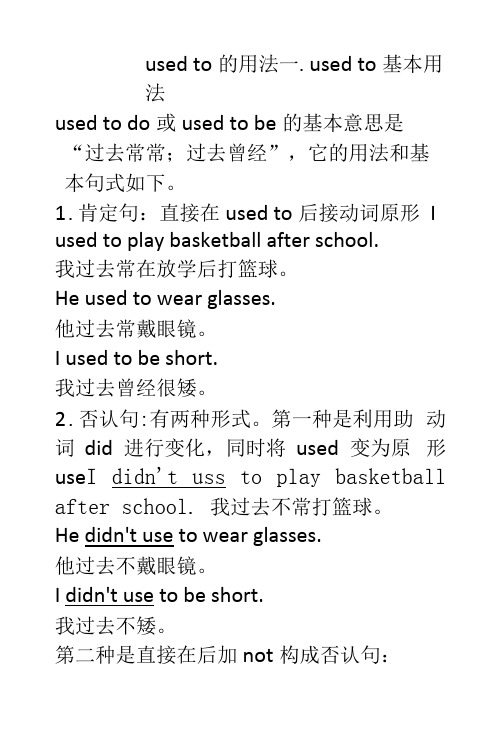
used to的用法一.used to基本用法used to do或used to be的基本意思是“过去常常;过去曾经”,它的用法和基本句式如下。
1.肯定句:直接在used to后接动词原形I used to play basketball after school.我过去常在放学后打篮球。
He used to wear glasses.他过去常戴眼镜。
I used to be short.我过去曾经很矮。
2.否认句:有两种形式。
第一种是利用助动词did进行变化,同时将used变为原形use I didn't uss to play basketball after school. 我过去不常打篮球。
He didn't use to wear glasses.他过去不戴眼镜。
I didn't use to be short.我过去不矮。
第二种是直接在后加not构成否认句:school.(改为否认句)Tom used to be a quiet boy.(改为一般疑问句并作否认回答)22.我过去常常和朋友们一起打棒球。
(翻译句子)There used to a stone bridge over the river. (be )The key:l.C2.B3.B4.D5.C5.B7.A8.B9.A10.A11. C 12.D 13.Bdidn/t he/ usedn't he14.MakingDrinking15.to cut/for cuttingPlaying16.fish/go fishingbe nervous about17.My brother didn't use to play soccer at school.或My brother usedn't to play soccer at school.18.Did Tom use to be a quiet boy, didn't he?No, he didn't.19.I used to play baseball with my friends.20.beI used not to play basketball after school. He used not to wear glasses.I used not to be short.3.一般疑问句:有两种形式,第一种是利用助动词did进行变化,同时把used 变为use,如:Did you use to play basketball after school? 你过去常在放学后打篮球吗?肯定回答:Yes, I did.否认回答:No, I didn't.Did he use to wear glasses?Yes, he did.No, he didn't.Did you use to be short?你过去矮吗?Yes, I did.No, I didn't.4.反义疑问句You used to be short, didn't you?你过去很矮,不是吗?Yes, I did.是的,我过去很矮。
初中英语知识点归纳常见动词短语和习惯搭配
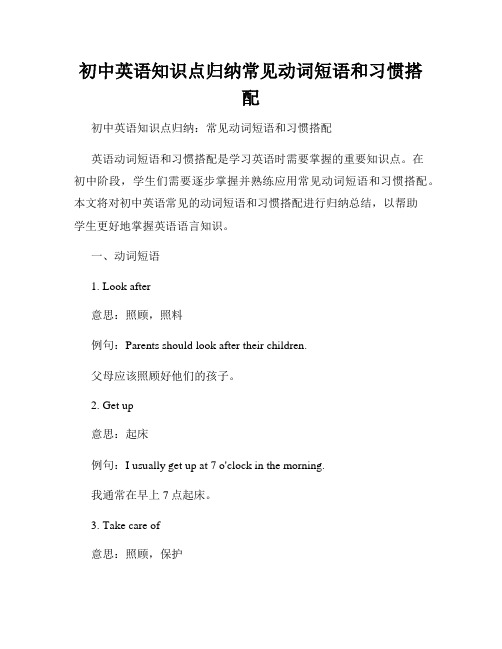
初中英语知识点归纳常见动词短语和习惯搭配初中英语知识点归纳:常见动词短语和习惯搭配英语动词短语和习惯搭配是学习英语时需要掌握的重要知识点。
在初中阶段,学生们需要逐步掌握并熟练应用常见动词短语和习惯搭配。
本文将对初中英语常见的动词短语和习惯搭配进行归纳总结,以帮助学生更好地掌握英语语言知识。
一、动词短语1. Look after意思:照顾,照料例句:Parents should look after their children.父母应该照顾好他们的孩子。
2. Get up意思:起床例句:I usually get up at 7 o'clock in the morning.我通常在早上7点起床。
3. Take care of意思:照顾,保护例句:She takes care of her little sister every day.她每天照顾她的小妹妹。
4. Make friends with意思:与某人交朋友例句:I want to make friends with students from different countries.我想和来自不同国家的学生交朋友。
5. Look for意思:寻找例句:I can't find my pen. Can you help me look for it?我找不到我的钢笔。
你能帮我找找吗?6. Put on意思:穿上例句:Don't forget to put on your coat. It's cold outside.别忘了穿上外套,外面很冷。
7. Take off意思:脱下例句:Please take off your shoes before entering the house.请在进屋前脱下你的鞋子。
二、习惯搭配1. Have a good time意思:度过愉快的时光例句:We had a good time at the beach yesterday.我们昨天在海滩度过了愉快的时光。
中考英语高频短语和习惯用法
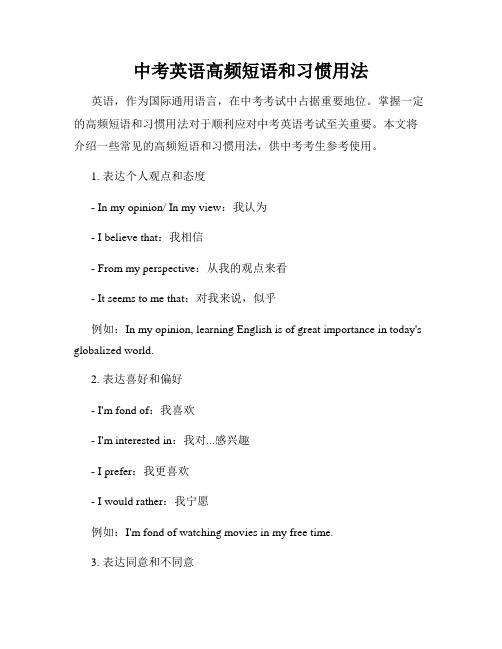
中考英语高频短语和习惯用法英语,作为国际通用语言,在中考考试中占据重要地位。
掌握一定的高频短语和习惯用法对于顺利应对中考英语考试至关重要。
本文将介绍一些常见的高频短语和习惯用法,供中考考生参考使用。
1. 表达个人观点和态度- In my opinion/ In my view:我认为- I believe that:我相信- From my perspective:从我的观点来看- It seems to me that:对我来说,似乎例如:In my opinion, learning English is of great importance in today's globalized world.2. 表达喜好和偏好- I'm fond of:我喜欢- I'm interested in:我对...感兴趣- I prefer:我更喜欢- I would rather:我宁愿例如:I'm fond of watching movies in my free time.3. 表达同意和不同意- I agree with:我同意- I disagree with:我不同意- I think so too:我也这么认为- That's true:那是真的例如:I agree with the idea that students should wear school uniforms.4. 表达建议和要求- You should/ ought to:你应该- It's advisable to:建议- Could you please:你能,请例如:You should study harder if you want to improve your English.5. 表达感觉和状态- I feel:我感觉- I'm happy/ sad/ tired:我开心/难过/疲倦- I'm excited about:我对...感到兴奋- I'm worried about:我为...担心例如:I feel nervous before taking an exam.6. 表达原因和结果- Because:因为- So:所以- As a result:因此- Therefore:因此例如:Because of the heavy rain, the baseball game was canceled.7. 表达经历和经验- I have ever:我曾经...- I have never:我从来没有...- I have been to:我去过...- I have learned:我学到了...例如:I have never been to Beijing, but I really want to visit there someday.8. 表达目的和计划- In order to:为了- To:为了- I plan to:我计划- I intend to:我打算例如:In order to improve my English speaking skills, I practice with a native speaker every week.以上是一些常见的中考英语高频短语和习惯用法,掌握这些短语和用法能够帮助考生在中考英语考试中取得好成绩。
初中英语中考必考时态结构及用法详解(共八种)
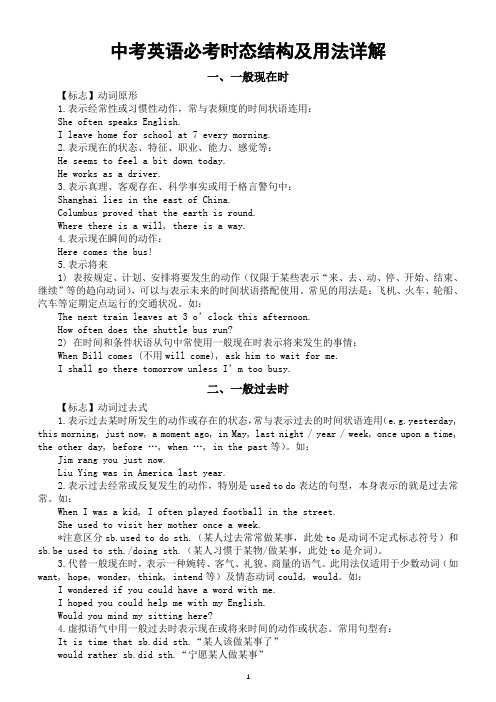
中考英语必考时态结构及用法详解一、一般现在时【标志】动词原形1.表示经常性或习惯性动作,常与表频度的时间状语连用:She often speaks English.I leave home for school at 7 every morning.2.表示现在的状态、特征、职业、能力、感觉等:He seems to feel a bit down today.He works as a driver.3.表示真理、客观存在、科学事实或用于格言警句中:Shanghai lies in the east of China.Columbus proved that the earth is round.Where there is a will, there is a way.4.表示现在瞬间的动作:Here comes the bus!5.表示将来1) 表按规定、计划、安排将要发生的动作(仅限于某些表示“来、去、动、停、开始、结束、继续”等的趋向动词),可以与表示未来的时间状语搭配使用。
常见的用法是:飞机、火车、轮船、汽车等定期定点运行的交通状况。
如:The next trai n leaves at 3 o’clock this afternoon.How often does the shuttle bus run?2) 在时间和条件状语从句中常使用一般现在时表示将来发生的事情:When Bill comes (不用will come), ask him to wait for me.I shall go there tomorrow unless I’m too busy.二、一般过去时【标志】动词过去式1.表示过去某时所发生的动作或存在的状态,常与表示过去的时间状语连用(e.g.yesterday, this morning, just now, a moment ago, in May, last night / year / week, once upon a time, the other day, before …, when …, in the past等)。
初中英语知识点归纳固定搭配和习惯用语的运用

初中英语知识点归纳固定搭配和习惯用语的运用在学习初中英语的过程中,我们经常会遇到一些固定搭配和习惯用语。
它们是英语语言中的常见搭配和惯用表达方式,在提高我们的英语表达能力和理解能力方面起着重要的作用。
本文将归纳总结初中英语中常用的固定搭配和习惯用语,并通过实例进行说明和运用。
一、固定搭配1. make a decision:做出决定例句:He made a decision to study abroad next year.2. take a break:休息一下例句:Let's take a break and have a cup of tea.3. give a hand:帮助例句:Can you give me a hand with this heavy box?4. take a look:看一看例句:Can I take a look at your new book?5. have a good time:玩得开心例句:We had a good time at the party last night.6. catch a cold:感冒例句:She caught a cold and had to stay at home.7. keep in touch:保持联系例句:Let's keep in touch after graduation.8. pay attention to:注意例句:You should pay attention to your spelling mistakes.9. take care of:照顾例句:My sister takes care of our pet dog.10. make progress:取得进步例句:He has made great progress in learning English.二、习惯用语1. A piece of cake:易如反掌,轻而易举例句:The math problem is a piece of cake for him.2. Break the ice:打破僵局例句:She told a joke to break the ice at the party.3. Hit the books:开始用功读书例句:It's time to hit the books and prepare for the exam.4. Let the cat out of the bag:泄露秘密例句:I accidentally let the cat out of the bag about the surprise party.5. On cloud nine:非常开心例句:She was on cloud nine after winning the competition.6. A piece of advice:一条建议例句:Here's a piece of advice for you: always be prepared.7. It's a piece of cake:太容易了例句:Don't worry, solving this math problem is a piece of cake.8. A bull in a china shop:笨手笨脚的人例句:He's like a bull in a china shop, always knocking things over.9. In the same boat:处境相同例句:We're all in the same boat, facing the same difficulties.10. A blessing in disguise:因祸得福例句:Losing his job turned out to be a blessing in disguise for him.通过以上的固定搭配和习惯用语的例子,我们可以更好地理解它们的用法和意义。
中考英语语法总复习大全 第一篇句法之常见习惯用语

第二篇句法三、常见习惯用语(一)知识概要由于英语国家的语言习惯与中国的语言习惯有许多不同之处,所以造成了许多同学在做选择或书写,或与人交谈中造成误用中国方式来对英语的问句作解答。
例如一个小女孩十分好看,可爱,外国人见到时会讲:You are so beautiful 这时的答语应该是 Thank you 如果外国人发现你的英语不错,他们会讲: Your English is very good 这时中国人常常会说:不,我说的不好。
这纯是一种礼貌的答语,但是不符合英语习惯。
它正确的答语应是 Thank you 虽然交际英语有一些规律可讲,但更重要的是学习外国的生活习惯,了解他们的文化背景,历史渊源,这样才能真正的学好一门外语。
(二)正误辨析[误] - What can I do for you?- Yes, please help me[正] - What can I do for you?- I'd like to buy a sweater[析] What can I do for you? 这一问语实际上用于的情景很多,要根据具体情况而定。
如在商店中售货员讲这句话应译为:您想要点什么?在其他场合也可以被译为:我能为您做些什么?它的答语应是直接讲出想让对方提供的帮助。
[误] - Which colour do you like?- Sorry, I don't like[正] - Which colour do you like?- I prefer blue[析]由 which 来提问的问句是要回答具体的选择,而不能泛指,泛泛的回答。
如 Yes, I like it[误] Do you like to come with us tonight?[正] Would you like to come with us tonight?[析] Do you like …问的是对方的习惯,如: Do you like swimming? Do you like collecting stamps? 而 would you like …则是一次性的邀请、提议。
九年级:2021中考英语语法常见习惯用语知识复习

九年级:2021中考英语语法常见习惯用语知识复习初中英语新课程标准教材英语教案 ( 20__ - 0 2021 学年度第二学期 ) ) 学校:年级:任课教师:英语教案 / 初中英语 / 九年级英语教案编订:_ __ 文讯教育机构初中英语教案文讯教育教学设计第 2 页共 33 页 9 20__ 中考英语语法常见习惯用语知识复习常见习惯用语(一)知识概要由于英语国家的语言习惯与中国的语言习惯有许多不同之处,所以造成了许多同学在做选择或书写,或与人交谈中造成误用中国方式来对英语的问句作解答。
例如一个小女孩十分好看,可爱,外国人见到时会讲:you are so beautiful 这时的答语应该是 thank you 如果外国人发现你的英语不错,他们会讲:your english is very good 这时中国人常常会说:不,我说的不好。
这纯是一种礼貌的答语,但是不符合英语习惯。
它正确的答语应是 thank you 虽然交际英语有一些规律可讲,但更重要的是学习外国的生活习惯,了(二)正误辨析[误] - what can i do for you? - yes, please help me 教材简介:本教材主要用途为通过学习英语的内容,提高学生的语言技能,增加一项语言能力,有利于国际化的日常交流、生活、工作等,本教学设计资料适用于初中九年级英语科目, 学习后学生能得到全面的发展和提高。
本内容是按照教材的内容进行的编写,可以放心修改调整或直接进行教学使用。
初中英语教案文讯教育教学设计第 3 页共 33 页[正] - what can i do for you? - i"d like to buy a sweater [析] what can i do for you? 这一问语实际上用于的情景很多,要根据具体情况而定。
如在商店中售货员讲这句话应译为:您想要点什么?在其他场合也可以被译为:我能为您做些什么? [误] - which colour do you like? - sorry, i don"t like [正] - which colour do you like? - i prefer blue [析]由which 来提问的问句是要回答具体的选择,而不能泛指,泛泛的回答。
中考英语二轮专题 书面表达常见错误分析(六) 习惯用法和固定搭配

中考英语二轮专题:书面表达常见错误分析(六)习惯用法和固定搭配「要点领悟」有的同学在写作时常常把一些习惯用语、固定词组及结构错误搭配,结果写出来的句子让人看不懂。
我们在平时若将这些英语基础知识牢固掌握,考试时就会得心应手、从容自若。
「信息提示」2005年10月1日星期六睛昨天你叔叔打电话来,请你找几个朋友去他农场收桔子。
于是今天早上6点,你和朋友就坐汽车出发了。
一到农场便开始干活。
桔子树上结满了桔子,你们又摘桔子又装车,忙完后在那儿吃了午餐,还吃了不少桔子。
下午坐卡车回家。
你们虽然忙了一天,却感到非常快乐。
请根据以上提示写一篇80词左右的英语日记。
请注意日记的格式。
「习作实况」October 1,2005,Saturday Su nnyMy uncle called me yesterday. He said in the phone (1) that he had an orange harvest. He needed some help. He asked me to go there with my friends. Today morning (2) we left home at 6:00. We went there by a bus (3)。
The trees in (4)the farm were really full with (5) oranges. When we got there, we began to work at once. We picked a lot of oranges and put them in the boxes. Some strong boys carried the boxes into a truck. After work, we had the lunch (6) at my uncle‘s house. We had many oranges, too. In the afternoon, we came back home by truck. We were busy today, but we were happy.「精讲点拨」(1)“在电话里说……”应用介词on.(2)“今天上午”的英语说法是this morning.(3)by+交通工具名词时,其间不用冠词或其他修饰词。
2022年中考英语备考之一习惯用法

习惯用法1.There be 结构a.这是英语中常见的一种结构,表示“某地有某物”其含义为“存在有”。
eg.There are twenty girls in our class.have也解释为“有”但是与there be有区别,它的含义是“所有,属有”,其主语为某人。
eg.I have a nice watch.b.There be 结构中的be动词要和后面所跟名词保持一致。
c.There is a river near our school.否:There is not a river near our school.问:Is there a river near our school.回答:Yes, there is. No, there isn’t.d.there be 结构的一般将来时,同学们较难掌握,其正确形式为:there is going to bee.反意疑问句的构成:There is no water in the glass, is there?2.so,neither引导的倒装句,为了避免和前一句话的内容重复,英语中习惯用so,neither引导的倒装句。
a.So+be(助动词,情态动词)+主语。
表示某人也是如此。
eg.Mike has bought some foreign stamps. So has Bob.=Bob has bought some,too.b.Neither+be(助动词,情态动词)+主语,表示某人也不。
eg.Mother has never been to Japan. Neither has Father.=Father has never been to Japan, either.c.So+主语+be(助动词,情态动词)。
表示果真如此(赞同), 请同学们与a.区别。
eg.A:Mike is right in the classroom.B:So he is.=He is really in the class room.3.It’s+时间+since动词过去式。
- 1、下载文档前请自行甄别文档内容的完整性,平台不提供额外的编辑、内容补充、找答案等附加服务。
- 2、"仅部分预览"的文档,不可在线预览部分如存在完整性等问题,可反馈申请退款(可完整预览的文档不适用该条件!)。
- 3、如文档侵犯您的权益,请联系客服反馈,我们会尽快为您处理(人工客服工作时间:9:00-18:30)。
1. 否定陈述句。 2. 疑问句。 3. 肯定陈述句,意为“任何”。 4. 在条件状语从句中,意为“一些,什么”。 区别:
sometime 某一时间 sometimes 有时
some time 一些时间 some times 几次(一些次数)
( B ) 10. If you spend _____ more
(C ) 14. It’s late. My father is still
_____ work. A. on B. for C. at D. with
( D ) 15. I _____ your help. I can do it
一、选择填空
考查重点:词汇、语法、习惯用法等。
解题方法:
1. 直接法 2. 排除法
例:( B )Can you tell me ______ the Shanghai Railway Station?
A: how can I get to B: which is the way to C: where is D: how can I arrive in
( B) 4. Peter, show me your _____ hand. What’s in it ?
A. the other B. other C. another D. others
三个区别
1. 两个“另一个”: the other (两者中) , another (泛指)。
2. 加S和不加S: 加S相当于名词;不加S,相当于形容词。
表示顺序的方法
1. the + 序数词 + 名词 2. 名词 + 基数词
( B) 9. Please come to my office
if you have _____ questions
to ask.
A. some
B. any
C. all
D. either
some 用于:
1. 肯定陈述句。 2. 语气婉转或希望得到肯定回答。 3. 意为“某个”,如:There’s some woman at the door.
B. parcel
C. luggage
D. thing
( A) 3. I saw only Miss Li in the office.
_____ teachers are having a
meeting in the hall.
A. The other B. Others
C. Other
D. The others
三者 all none any among
( A) 6. _____ people like watching TV. A. Most B. Most of C. The most D. The most of
• many people
most people
• many of the people the people
3. 加the 和不加the: 加the , 表示指定;不加the,表示泛指。
( D) 5. There are many trees
on ______ side of the
playground.
A. either B. both
C. all
D. any
都 都不 任何 在…之间
两者 both neither either between
most of
( A) 7. ______ the men astronauts ______ the women astronauts has been to the moon.
A. None of, and B. Neither, nor
C. Both, and
D. Either, or
( D) 8. ______ is the easiest in ______ . A. Lesson Six, the Book Three B. The Lesson Six, the Third Book C. The Six Lesson, Book Third D. Lesson Six, the Third Book
minutes on your English
every day, you will be
better at your English.
A. few
B. a few
C. little
D. a little
形容词、副词的比较级前可以加: much, a little, a lot, even, still 等,
A. exciting , excited B. excited , excited C. exciting , exciting D. excited , exciting
现在分词作形容词, 常用于物,且含“主动”或 动作还在进行。
过去分词作形容词, 常用于人,且含“被动”或 动作已完成。
( D)12. How excited they were
但不可以加: many, a few。
但是,比较级修饰名词时, 如果是可数名词,比较级前可加a few, many; 如果是不可数名词,比较级前可加a little, much。 如:a little more time, many more books.
( D) 11. We felt _____ after we heard the _____ news.
练习题:
(C)1. It’s _____ to travel round the world.
A. a great fun B. great funny
C. great fun
D. greatly fun
(C)2. Please tell me how much _____
is free.
A. bag
_____ the beautiful sea !
A. seeing
B. watching
C. to look D. t excited _____ the beautiful sea.
(C ) 13. The price of this kind of
car is _____ . A. expensive B. cheap C. high D.expense
